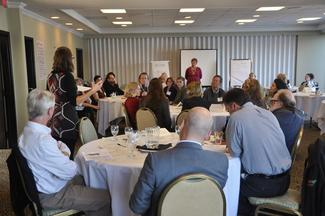Part 3 of my SLM Field Experience Trilogy
On October 24 -25, 2013, Canadians gathered in Cowichan Bay, British Columbia, to discuss the future of training for traditional craft trades in this country. Funded by the Social Science and Humanities Research Council of Canada (SSHRC), this Knowledge Exchange Forum brought together artisans, policy-makers, academics, innovators, investors and industry leaders. It was the first time that such a diverse group of stakeholders sat in the same room to establish a common vision around the future of the traditional craft trades sector—a sector that keeps Canadian heritage alive by preserving traditional knowledge and skills. (Examples of traditional craft trades include cheese making, glass blowing, ceramics, wine and cider making, wood and leather working, metal smithing, jewellery making, herb processing, distilling and brewing, etc.)
One of the goals of the Forum was to have key stakeholders identify gaps in the training mechanisms that exist for traditional craft trades in Canada—gaps that may not have emerged from a review of the literature. Three types of training were discussed: classroom instruction (e.g. degree or certificate programs), hands-on learning (e.g. apprenticeships and internships) and professional development training (e.g. business management, marketing, learning new technologies, etc.). From the discussions, new findings emerged, which will be expressed in the final report for policy-makers and available to the public in early 2014.
Project leaders are Nicole Vaugeois, PhD, from Vancouver Island University’s World Leisure Centre of Excellence, and Pascale Knoglinger, Project Manager for Économusée BC of the Société de développement économique de la Colombie-Britannique. As a Master’s student in Sustainable Leisure Management at Vancouver Island University and as a former intern for Économusée BC, this project has bridged two familiar contexts for me while also addressing the broader theme of creative economies, which is the area that my own research explores. I was glad to be a part of such a meaningful initiative and I look forward to future involvement in projects surrounding the traditional craft trades labour market.

